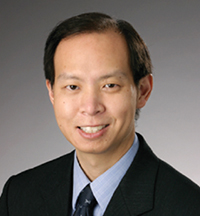Posted on Sep 30, 2016 in
FOCUS ON THE CURE

Dr. Meghana Bhandari
Texas Oncology–
Sugar Land

Dr. Branden Hsu
Texas Oncology–
Katy and Texas Oncology–
Houston Memorial City
In the United States, one in eight women will be diagnosed with invasive breast cancer during her lifetime. While awareness of breast cancer has improved, the disease unfortunately remains the second-deadliest cancer among American women.
This year in Texas, 15,712 women will be diagnosed with breast cancer, and 2,843 women will die from the disease. Men are at risk, too: 132 men in Texas are expected to be diagnosed with breast cancer in 2016, with 28 cases proving fatal.
Other than adopting a healthier lifestyle, early detection with regular mammograms remains the single most effective way for combating the disease. When detected early before it spreads, women have a 99 percent survival rate after five years.
“We’ve made tremendous strides in the last 10 years due in part to awareness about the importance of screening and early detection,” said Dr. Meghana Bhandari. “Mammograms can detect a high percentage of breast cancer in women who don’t have symptoms, but they are not the only way to identify breast cancer.”
Women should begin monthly breast self-exams in their 20s and report any changes to a physician immediately. Women in their 20s and 30s should have a clinical breast exam every three years. Women in their 30s should discuss their breast cancer risk level with a physician to determine the most appropriate cancer screening options, including mammograms and MRI screenings. Women ages 40 and older should discuss individual risk factors with a physician to determine recommended timing and most appropriate screenings, including an annual mammogram, annual clinical breast exam and annual MRI screening. Women ages 50 and older should have a mammogram and a clinical breast exam at least every two years after discussion with her physician, and if recommended by a physician, an annual MRI screening. If any changes in the breast are detected, contact a physician immediately to be evaluated. If cancer is diagnosed, women have many treatment options.
“At Texas Oncology, our community-based cancer care gives patients the ability to receive most or all of their medical and support services under one roof in the comfort of their own communities near the critical support of family and friends,” said Dr. Branden Hsu. “We provide high-quality care in just about every corner of Texas, including here in the greater Houston area.”
Advances in the fight against breast cancer are made every day. In fact, Texas Oncology has played a role in nearly 60 FDA approved cancer-fighting drugs, about one-third of all cancer therapies approved by the FDA to date.
Until a cure for breast cancer is found, regular screenings, awareness and healthy lifestyle choices such as eating well and exercising regularly are among the best tools a woman has to reduce her risk of developing the disease.













